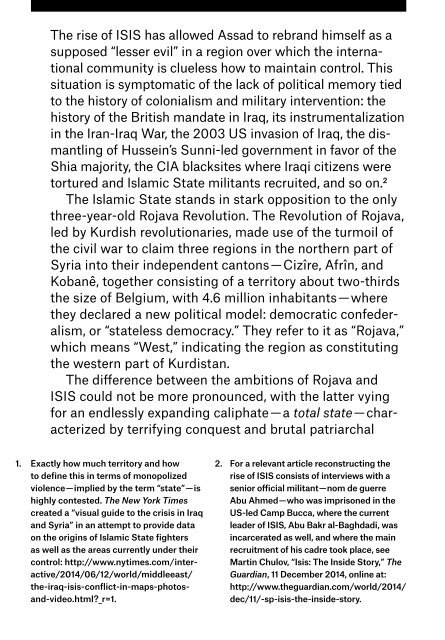Stateless Democracy
NWA5-Stateless-Democracy
NWA5-Stateless-Democracy
Create successful ePaper yourself
Turn your PDF publications into a flip-book with our unique Google optimized e-Paper software.
The rise of ISIS has allowed Assad to rebrand himself as a<br />
supposed “lesser evil” in a region over which the international<br />
community is clueless how to maintain control. This<br />
situation is symptomatic of the lack of political memory tied<br />
to the history of colonialism and military intervention: the<br />
history of the British mandate in Iraq, its instrumentalization<br />
in the Iran-Iraq War, the 2003 US invasion of Iraq, the dismantling<br />
of Hussein’s Sunni-led government in favor of the<br />
Shia majority, the CIA blacksites where Iraqi citizens were<br />
tortured and Islamic State militants recruited, and so on. 2<br />
The Islamic State stands in stark opposition to the only<br />
three-year-old Rojava Revolution. The Revolution of Rojava,<br />
led by Kurdish revolutionaries, made use of the turmoil of<br />
the civil war to claim three regions in the northern part of<br />
Syria into their independent cantons — Cizîre, Afrîn, and<br />
Kobanê, together consisting of a territory about two-thirds<br />
the size of Belgium, with 4.6 million inhabitants — where<br />
they declared a new political model: democratic confederalism,<br />
or “stateless democracy.” They refer to it as “Rojava,”<br />
which means “West,” indicating the region as constituting<br />
the western part of Kurdistan.<br />
The difference between the ambitions of Rojava and<br />
ISIS could not be more pronounced, with the latter vying<br />
for an endlessly expanding caliphate — a total state — characterized<br />
by terrifying conquest and brutal patriarchal<br />
1. Exactly how much territory and how<br />
to define this in terms of monopolized<br />
violence — implied by the term “state” — is<br />
highly contested. The New York Times<br />
created a “visual guide to the crisis in Iraq<br />
and Syria” in an attempt to provide data<br />
on the origins of Islamic State fighters<br />
as well as the areas currently under their<br />
control: http://www.nytimes.com/interactive/2014/06/12/world/middleeast/<br />
the-iraq-isis-conflict-in-maps-photosand-video.html?_r=1.<br />
2. For a relevant article reconstructing the<br />
rise of ISIS consists of interviews with a<br />
senior official militant — nom de guerre<br />
Abu Ahmed — who was imprisoned in the<br />
US-led Camp Bucca, where the current<br />
leader of ISIS, Abu Bakr al-Baghdadi, was<br />
incarcerated as well, and where the main<br />
recruitment of his cadre took place, see<br />
Martin Chulov, “Isis: The Inside Story,” The<br />
Guardian, 11 December 2014, online at:<br />
http://www.theguardian.com/world/2014/<br />
dec/11/-sp-isis-the-inside-story.<br />
policies of cultural assimilation, subjection, and the enslavement<br />
of women. Such ambitions have made ISIS into<br />
the bizarre, dark mirror image of the total state of the security<br />
apparatus of the coalition of the willing’s never-ending<br />
War on Terror and its radical and violent disregard for other<br />
states’ and peoples’ sovereignty. Against the state terror<br />
of both ISIS and the coalition of the willing, the Rojava<br />
Revolution forms an alternative that it has termed its “third<br />
way,” in an echo of the project of Third Worldism, not as<br />
a source of tragedy to be scavenged by governments’ oil,<br />
mineral, and state-building projects masked as “development,”<br />
but as an actual, radically new political and internationalist<br />
— transnationalist — paradigm. 3<br />
Despite the fact that the Rojava Revolution is led by<br />
Kurds, the political institutions that they have developed<br />
resist an ethnic monopoly over their three independent<br />
cantons. The three autonomous cantons of Rojava are<br />
founded on what on 29 January 2014 was officially announced<br />
as The Social Contract — in reference to Jean-<br />
Jacques Rousseau’s famous text from 1762 — co-written<br />
by all peoples living in the region: Kurds, Arabs, Assyrians,<br />
Chaldeans, Arameans, Turkmen, Armenians, and Chechens.<br />
The document features a series of ideological principles<br />
that are fundamental to understanding the politics of<br />
the three autonomous cantons of Rojava. From the contract<br />
and related texts of its main inspiration, Abdullah Öcalan,<br />
founder of the Kurdistan Workers’ Party (PKK), I have distilled<br />
the following six defining points:<br />
The first is that of a radical secular politics, meaning that<br />
religious interests are fully separated from governance affairs.<br />
3. Curator Vivian Ziherl speaks of the term<br />
of “Thirld Worldism” as a history that<br />
has to be continuously rewritten, thus<br />
questioning dominant linear — modernist<br />
— narratives that laid the foundation for<br />
colonization as such. One such attempt<br />
at an alternative historical exploration<br />
of Third Worldism can be found in Vijay<br />
Prashad’s The Darker Nations: A People’s<br />
History of the Thirld World (New York: The<br />
New Press, 2007).<br />
234–235


